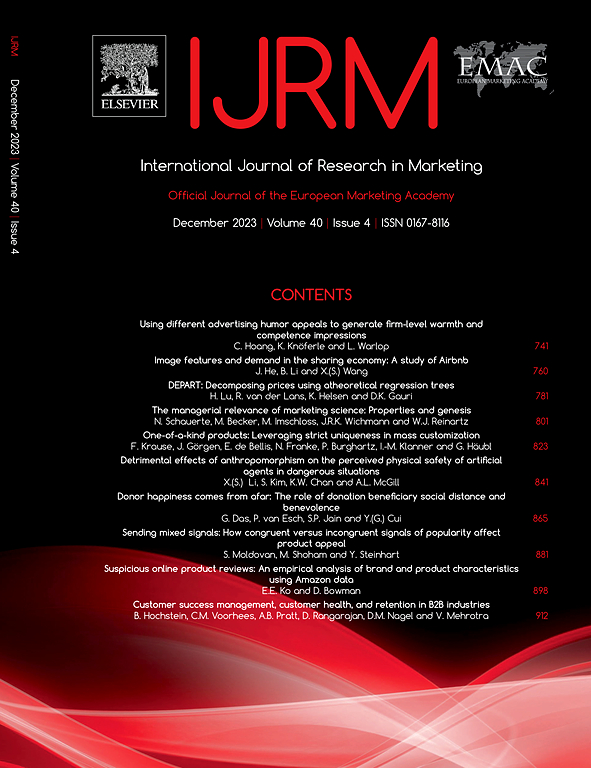外表的改善会增加亲社会行为
IF 7.5
2区 管理学
Q1 BUSINESS
International Journal of Research in Marketing
Pub Date : 2025-06-01
DOI:10.1016/j.ijresmar.2024.09.001
引用次数: 0
摘要
消费者越来越注重提升自己的美丽,这是一种全球趋势,主要是由社交媒体的无处不在的影响推动的。在改善个人形象上投入大量金钱和时间,这引发了人们对这种行为的更广泛的社会影响的质疑。这项研究探讨了个人美化外表的改进是否会影响他们在与美无关的领域的行为,特别是在亲社会消费行为方面。在包括实地实验在内的七项研究中,我们发现,无论是实际的还是数字化的,参与外貌改善都能提高消费者的公众自我意识。这种意识的提高导致更频繁的亲社会行为,如慈善捐赠和道德购买决策。此外,我们的研究表明,这种亲社会行为的倾向随着外表的改善而变得更加明显,这对其他人来说是显而易见的。认识到身体的改善是亲社会行为的催化剂,对非营利组织来说意义重大,它提供了机会来制作更有效的呼吁和优化广告策略,以促进亲社会行为。本文章由计算机程序翻译,如有差异,请以英文原文为准。
Physical appearance improvements increase prosocial behavior
Consumers are increasingly focusing on enhancing their beauty, a global trend significantly driven by the pervasive influence of social media. The substantial investments of both money and time into personal appearance improvement raises questions about the broader societal effects of such behavior. This study explores whether improvements in individuals’ beautifying physical appearance can influence their behavior in areas unrelated to beauty, particularly in regard to prosocial consumer behavior. Across seven studies, including a field experiment, we find that engaging in physical appearance improvement, either actual or digital, increases public self-awareness among consumers. This heightened awareness leads to more frequent prosocial actions, such as charitable donations and ethical purchasing decisions. Furthermore, our research suggests that this inclination towards prosocial behavior becomes more pronounced with improvements in appearance that are noticeable to others. Recognizing physical improvement as a catalyst for prosociality holds significant implications for nonprofit organizations, offering opportunities to craft more effective appeals and optimize advertising strategies to foster prosocial behavior.
求助全文
通过发布文献求助,成功后即可免费获取论文全文。
去求助
来源期刊
CiteScore
11.80
自引率
4.30%
发文量
77
审稿时长
66 days
期刊介绍:
The International Journal of Research in Marketing is an international, double-blind peer-reviewed journal for marketing academics and practitioners. Building on a great tradition of global marketing scholarship, IJRM aims to contribute substantially to the field of marketing research by providing a high-quality medium for the dissemination of new marketing knowledge and methods. Among IJRM targeted audience are marketing scholars, practitioners (e.g., marketing research and consulting professionals) and other interested groups and individuals.

 求助内容:
求助内容: 应助结果提醒方式:
应助结果提醒方式:


